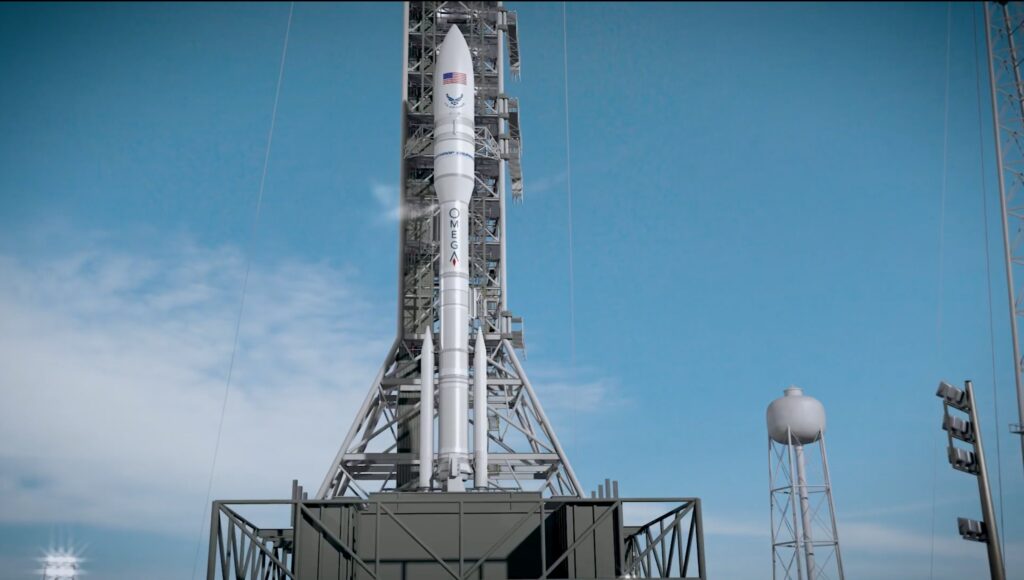Products You May Like
WASHINGTON — Startup satellite builder Saturn Satellite Networks says it doesn’t have a customer lined up for the small geostationary spacecraft it booked aboard the inaugural launch of Northrop Grumman’s OmegA rocket, but reserved the 2021 mission to save time down the road.
Northrop Grumman announced Dec. 12 that Saturn agreed to launch one or two of its NationSat line of small geostationary communications satellites on the maiden flight of OmegA, a solid-fueled rocket Northrop Grumman is building to compete for U.S. national security missions.
Saturn CEO Jim Simpson said making the OmegA launch reservation before it has customers locked down for the NationSat spacecraft OmegA would carry is part of the startup’s strategy for providing a one-stop-shop for its target customers.
“Part of our objective is to provide delivery in orbit of our satellite systems,” Simpson said in a Nov. 12 interview. “As such, it’s very incumbent upon Saturn to secure multiple launch options to give customers multiple alternatives at the lowest possible cost.”
Saturn formed earlier this year to build small geostationary satellites for customers that can’t afford or justify a traditional, multiton communications satellite. It considers small nations ideal customers.
Saturn’s first NationSat satellite, for Moscow-based Intersputnik, is slated to launch on a shared SpaceX Falcon 9 mission that has slipped from 2020 to 2021.
Simpson said Saturn will retain ownership of the satellite, but will lease the capacity to Intersputnik for the lifetime of the spacecraft. Simpson said Saturn will provide lifetime capacity leases or full ownership of satellites depending on customer preference and regulatory restrictions.
Simpson said Saturn is close to clinching a second NationSat customer it expects to announce early next year. Whether that second NationSat will be assigned to OmegA or another rocket is to be determined, he said.
Saturn is offering NationSats as both single-operator satellites and so-called condosats shared by multiple operators.
Northrop Grumman is counting on Saturn to fill one of two certification flights it needs to fly to qualify OmegA for U.S. national security launches, said Charlie Precourt, Northrop Grumman’s vice president of propulsion systems. He said Northrop Grumman has a backup plan for those flights if Saturn’s satellites don’t come through in time, but he declined to discuss specifics.
“Those are details that we’ve worked with them behind the scenes,” Precourt said. “But our first focus is with the Air Force.”
Northrop Grumman’s primary focus with OmegA is the U.S. military market, having received a $792 million Launch Service Agreement from the Air Force last year meant to cultivate more launch options for the National Security Space Launch program.
The Air Force expects to select two launch providers next year, choosing among Northrop Grumman, SpaceX, Blue Origin and United Launch Alliance for launch contracts anticipated to be worth billions of dollars collectively.
Whether Northrop Grumman continues development of OmegA will be heavily influenced by the Air Force’s downselect.
Simpson said Saturn is aware of that risk.
“[That] is why we want to have multiple launch options to provide our customers,” he said. “No one wants to be reliant on one launch vehicle.”
Precourt said Saturn and Northrop Grumman have a contingency plan if OmegA is canceled.
“Suffice it to say that’s been contemplated and we’re dealing with it,” Precourt said, without elaborating.
Precourt said Northrop Grumman plans to use the Saturn launch as one of two certification flights to qualify the rocket for U.S. national security launches.
“We’re targeting somewhere in the first part of 2021 for that first flight and we’ll be right on the heels of it as quickly as we can with the second,” he said.
Precourt said Northrop Grumman keeps OmegA costs down by using the same factories and much of the same launch infrastructure as its smaller Antares rocket and NASA’s Space Launch System, a Boeing-led heavy-lift rocket with side-mounted solid rocket boosters supplied by Northrop Grumman. He said OmegAs price is “competitive,” but would not give a specific figure.
Simpson said his experience at Aerojet Rocketdyne, which supplies engines for United Launch Alliance rockets and Northrop Grumman’s OmegA, convinced him that any rocket the U.S. military chooses will be reliable for commercial customers as well.
“It provided us a lot of confidence that the launch vehicle would have all of the criteria that we would like to see in a launch vehicle tested prior,” he said. “That’s why we were excited about having OmegA as part of our launch vehicle options, because of the rigor that’s involved in being part of the NSSL program.”
Simpson said Saturn’s NationSats are small enough to fit on secondary payload adapters. Originally sized between 600 and 1,700 kilograms, Simpson said the largest NationSats will now be around 1,000 kilograms due to a decision to use electric propulsion instead of chemical.
Simpson said Saturn anticipates forming more placeholder launch agreements over the next 12 months.
